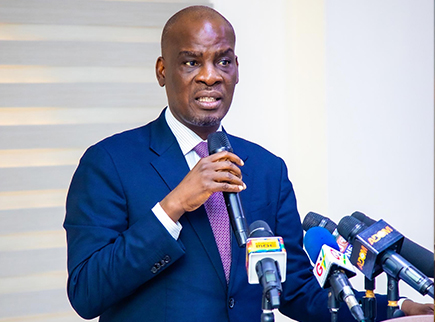Mr Haruna Iddrisu, the Minister of Education, says the rollout of the Ghana Secondary Learning Improvement Programme (GSLIP), a two-year World Bank-supported project valued at US$180 million, will end the double-track system in secondary education.
The Minister said a total of GHS 1.1 billion has been allocated under the GSLIP to execute infrastructure expansion and quality improvement in 2026.
This includes the expansion of Category A schools, upgrading 10 schools from Category B to Category A, upgrading 30 schools from Category C to Category B, and completing 30 Community Day Senior High Schools (E-Blocks).
These interventions represented a significant step toward enhancing quality and equity at the secondary level, the Minister announced during a press briefing in Accra.
Presenting the budget statement for 2026 by the Finance Minister on November 13, 2025, the Ministry of Education had been allocated GHS 39.23 billion to deliver on its planned programmes and interventions across basic, secondary, and tertiary education.
Out of this amount, GHS 33.76 billion will come from government funds, GHS 3.68 billion from internally generated funds, and GHS 1.8 billion from development partners through loans and grants.
The allocation represents a 23.5 percent increase over the 2025 approved budget.
In addition, the Minister said GETFund had been allocated GHS 9.9 billion, including GHS 4.2 billion earmarked for free SHS and free TVET infrastructure and services.
“Our vision is clear: to build an education system that is equitable, resilient, and responsive to the needs of a rapidly changing world, one that empowers every Ghanaian child with the knowledge, skills, and values to thrive,” he said.
He said the government had allocated GHS 292.4 million for the provision of sanitary pads to girls in public schools.
This initiative, he stressed, aimed to reduce absenteeism, improve retention, and promote menstrual hygiene management nationwide.
“We are continuing the ‘No Academic Fees’ policy for all first-year students in public tertiary institutions.
“Government has allocated GHS 537.4 million for this programme, representing a 7.6 percent increase over last year,” he said.
The Minister said a total of GHS 4.2 billion had been dedicated to sustaining and improving the Free SHS and Free TVET programmes.
“This investment ensures that every Ghanaian child, regardless of background, has access to secondary education. This represents a 16 per cent increase from GHS 3.5bn in 2025.”
The Minister presented a comprehensive policy paper to the Cabinet proposing the introduction of free education for all learners in special and inclusive schools.
The rest include the nationwide provision of modern assistive technology devices, enhanced nutritional support and sustained capacity building for teachers within the special education ecosystem.
“I am pleased to announce that, going into 2026 and beyond, an amount of GHS 50 million has been allocated to this initiative.
“This marks the beginning of a long-term national effort to bridge the equity gap and ensure that learners with special needs receive the dignity, resources, and opportunities they deserve.”
He said the budget strengthened foundational learning, drove secondary expansion, accelerated tertiary transformation, and laid the foundation for a dedicated national programme for special and inclusive education.
“Going forward all the manifesto commitments will be refined into performance agreements for heads of institutions under the Ministry of Education,” he said.

